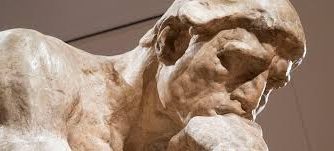A lot of people have had tremendous influence on how we think about things and approach life. Great thinkers have loudly voiced their thoughts and developed philosophies or worldviews . Some are optimistic, and some are so pessimistic you wonder how and why anyone would want to go on living!
Today we’re returning to our overview of some of the worldviews that have shaped men’s minds and hearts, and subsequently our children’s and the world’s. And even music. It doesn’t take much listening to some of the heavy metal lyrics to discover that many of these young men and women are devoid of hope and are profoundly depressed about and frustrated with life.
As we go through these views, think about whether your thinking and reasoning has been influenced in any way by them. We’ll cover two or three of them a week.
In the beginning—
It doesn’t take too much studying in history to realize that all ancient civilizations had some kind of worldview that involved worshiping a god or multitude of gods. Or nature. It’s only been fairly recent that people have dismissed the idea of a creator and universal ruler and gone out of their way to make sure god is removed from the public square, or education.
For our discussion, we’ll look at several God-focused worldviews: Theism and Deism.
Christian Theism—A Christian Theist believes that an omnipotent God exists and He has authored a Spirit-inspired and man written work called the Bible that is the final authority on life and living it. (Notice I didn’t say it is the final authority on how everything was and is created. It is not exhaustive in that regard.) This Bible contains precepts and laws upon which man should base society and living. Hence, God and the Bible have a real, significant and lasting impact on our lives.
Theism—A person who calls themselves a Theist might be referring to a Christian definition, or they might be a non-Christian theist who believes in a god or many gods. Because of this, it is extremely important to define your terms when you’re having a discussion with someone about “god.” The God you’re discussing and referring to might not at all be the god they worship or follow. They are not all the same.
A person who says they believe in and follow Jesus, but doesn’t believe in the immaculate conception of Him, or His resurrection, certainly doesn’t believe in the same Jesus as someone who believes those things.
There are some religions that identify as Christian, or Christ followers, but they believe that Jesus was really Satan’s brother, who was able to rise to the level He did because He was able to live a perfect life on Earth. They also don’t believe in the incarnation or that Jesus was the God Jehovah. They think all men can become gods, if they live a perfect enough life on Earth.
And there are others who believe that Jesus is the Archangel Michael, come down to Earth as God’s son to fight the battle. They also don’t believe in a true bodily resurrection, but see it (as the Gnostics did way before them) a spiritual one. They don’t believe Jesus is God incarnate, and they think only 180,000 select individuals will go to heaven. The rest of the followers will spend their eternity here on a redeemed Earth.
You can see that it’s critical to know who you’re talking about and define your terms.
Deism—Some of the founding fathers of the United States could be classified more as Deists than Theists. A Deist believes there is an authoritative creator, God, who has authored the Holy Bible, which is the source that should be used to guide men’s actions and governments.
A Deist knows that God was once omnipotent, before and during creation.
But they believe that once God finshed all of His creating, He decided to take a back seat in the affairs of men and, instead, distance Himself from the world and His creation. Hence, not be involved.
To them, the world can be looked at as a clock, once created by an intelligent being, but a clock that has been set on autopilot, more or less. Man is left to go it alone and figure out how the clock works and go on living.
They believe that you can know God only through reason and observation of nature, but not through a personal relationship, revelations, or miracles, which they would regard with skepticism.
Some do and some don’t believe in an afterlife. And among the believers of it, there is varying opinion.
If you’d like to do further reading on that subject, see this discussion posted on the Church of the Modern Deist website.
And you?
Which worldview would you ascribe to, or have you combined them in any way, leading you to have a melded or divided worldview?
NEXT WEEK: Romanticism and Naturalism (Can anyone say Tchaikovsky or the Disney movie, Pocahontas?)
Blessings,
Andrea
May you prosper in all things and be in health, just as your soul prospers (3 John 2).
Photo by Dawid Zawila


